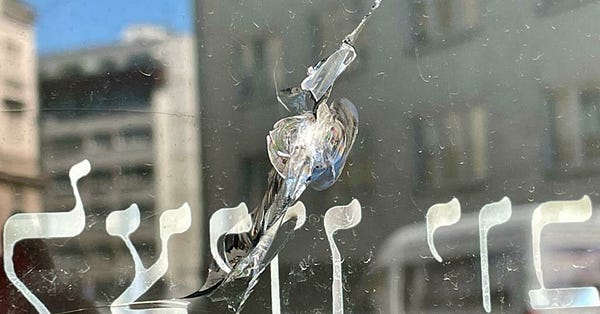Energy Insecurity
Russia’s invasion of Ukraine has highlighted Austria’s addiction to cheap Russian natural gas and lack of immediate environmentally-friendly alternatives

Servus!
The summer break is upon us, but in the east, Russia’s invasion of Ukraine continues. Russian forces are making slow and grinding progress in eastern Ukraine, capturing the cities of Sievierodonetsk and Lysychansk in recent days. Those victories mean Russia and its puppet Luhansk People's Republic control almost the entirety of Luhansk Oblast, “putting them in position to push on toward Ukrainian-held cities in Donetsk Oblast,” Thomas Gibbons-Neff reported in the Times Monday. It remains unclear, considering losses in both equipment and manpower, whether either side can sustain this war in the long run; “the fighting has clearly exhausted both sides.”
Neither side is currently in a position to achieve an outright victory over the other, which means that Russia’s invasion of Ukraine will likely drag on into the fall at the very least. For Europe, including Austria, this means there is no end in sight to the inflationary crisis that is driving up the cost of food and fuel, especially gas and heating oil, across the continent. In June, the rate of inflation hit 8.7 percent in Austria: up from 7.7 percent in May and the highest level it has been since September 1975. Austria’s rate of inflation is in line with the Eurozone average of 8.6 percent.
The longer the war continues, the worse things are going to get. Anyone who has been to a supermarket in Austria over the past few months would note the explosion in the price of basic goods, in particular those derived from wheat like bread and pasta and sunflowers like sunflower oil. Ukraine is a major producer of both, and as Peter Granitz recently reported for NPR, “Russian warships and Ukrainian mines are blocking shipping lanes through the Black Sea,” disrupting global supply chains, preventing the export of wheat, corn, sunflowers, and grains, and raising food and fertilizer prices to ‘unprecedented levels.’ As far, the Austrian government has mustered no direct response to rising food prices.
Rather, the most pressing issue for the government at present is Austria’s energy security. Though renewables including wind and hydroelectricity account for a decent percentage of Austrian domestic energy production and consumption, before the war the country was heavily reliant on Russia to meet its natural gas needs. 80 percent of Austria’s gas came from Russia, stored in facilities in eastern Austria prior to nationwide and inter-European distribution. In recent weeks, Russian gas deliveries have just about halved, while gas exports to Italy have depleted Austria’s existing gas reserves. Just today, Russia cut off gas deliveries from Kazakhstan to Europe which go through Russian gas terminals.
European leaders are mindful of the day when Russia finally decides to turn off the tap. In order to make it through the winter, the Austrian government is of the view that the country’s gas storage facilities need to be about 80 percent full by the autumn. In spite of current events, energy minister Leonere Gewessler sees no need to raise the alarm just yet, but her ministry is, for example, encouraging businesses and industrial operations that currently run on gas to convert and upgrade their systems to run on oil. Austrian energy providers such as Wien Energie as also preparing for a winter during which they may have to depend on oil more so than gas to meet their customers’ home heating needs.
These are, of course, short-term remedies with which an energy minister from the Green Party surely cannot be satisfied. Russia’s invasion of Ukraine has highlighted not only Austria’s obvious energy insecurity and addiction to cheap and once-plentiful Russian natural gas, but also the extent to which its immediate and available alternatives like oil are, both from a political and environmental perspective, even worse. Oil may get Austria through this winter, but staying clean and warm in subsequent years will depend on the country dramatically curtailing its use of gas for domestic and industrial use and further diversifying its energy portfolio. In that sense, ending its opposition to nuclear power might be a good start.
Bis bald!
Thank you for subscribing to the Vienna Briefing. If you know someone who might be interested in reading this newsletter, consider sharing it with them today.
The Vienna Briefing is a free newsletter. If you would like to support my work, you can send me a tip via PayPal.
No, No, No
Former chancellor Christian Kern (SPÖ) has put to bed speculation that he is planning a political comeback. Kern also used an interview with the Krone on Sunday to rule out founding a new centrist political party, as had been rumored in recent weeks.
Desecration
A Holocaust memorial in Vienna’s fifth district was discovered Tuesday to have been damaged. The glass monument marks the site of the former Jubiläumstempel on Siebenbrunnengasse, built in 1910 and destroyed on Kristallnacht in November 1938.


Cancel Culture?
The influential historian Oliver Rathkolb has come out against taking down Vienna’s statue of its former mayor, the political antisemite Karl Lueger. To remove the statue, Rathkolb argued, would send the "wrong signal" towards "political correctness" and usher in the "beginning of a cancel culture."


